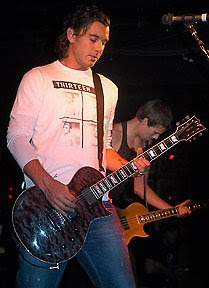After the British, post-grunge quartet Bush quietly disbanded in 2002, lead singer Gavin Rossdale took a leave of absence from the music scene.
During the following three years, Rossdale toyed with solo material, married fellow rock star Gwen Stefani, and even tried out his acting skills.

Finally, Rossdale has made his return to the rock game, in the form of his new band, Institute - a quartet featuring ex-members of Helmet and Rival Schools. Having finished a 13 date U.S. club tour and anticipating the release of its debut album Distort Yourself, Institute is gearing up for what appears to be a long-term commitment.
Over a decade ago, Bush exploded in the United States and made its entrance with the highly beloved album Sixteen Stone.

Featuring huge hits such as "Machine Head," "Everything Zen," and "Glycerine," their album, Sixteen Stone, was quickly celebrated as a staple of the 1990's alternative movement.
Bush's proceeding efforts secured its spot in the hearts of many loyal fans, yet the band found itself on hiatus once lead-guitarist Nigel Pulsford left in 2002.
Nevertheless, Rossdale continued with music as he contributed "Adrenaline" to the xXx soundtrack and even developed music for Blue Man Group.
Rossdale is now back full-time with Institute, a band that formed in the wake of Bush. When Pulsford departed in 2002, ex-Helmet guitarist Chris Traynor filled in on lead-guitar during Bush's last tour before disbanding.
With the seeds already planted, Rossdale and Traynor have reunited this time as Institute. Bassist Cache Tolman (ex-Rival Schools) and drummer Charlie Walker complete the quartet.
This may not be your typical rock super-group, which has become almost commonplace in the wake of Audioslave, but there is definitely the potential for greatness.
In a recent interview with The Heights, Rossdale clearly pronounced he's on a mission to make quality music: "We're taking it back to the spirit of music, not record sales.
It's all about playing with and for people and having a connection. Without them, we're just musicians in a band."
It's also clear that Rossdale has made good on his words. To the delight of many fans, Institute's August tour has been back-to-basics, without opening acts.
The venues are small, intimate clubs, and Rossdale is excited to play concerts in which they "take away the smoke and mirrors of big arena shows."
Fan reviews of Institute's August tour have been gushing with praise and excitement. The band has pleased many by playing Bush songs and even meeting fans after the shows.
But this is where the concern sets in. Is there a breathing, growing band in Institute, or is Institute just a glorification of Rossdale's illustrious past? It's difficult to say.
Obviously Rossdale is the center of attention. The video of "Bulletproof Skin," Institute's first single, is almost solely focused on Rossdale, while other members are shown at a distance.
Even at the band's Aug. 29 show at The Paradise, Rossdale captured the crowd with energetic interaction, while Traynor and company simply played in the background.
Also alarming is the sound of Institute. Crunchy guitars, lackluster percussion, and recycled, nu-metal hash make even the most faithful Rossdale fan cringe in disappointment.
Institute's sound is insipid in comparison to what Bush produced. Sure, Institute may have thrown in some catchy riffs and groovy melodies, but overall something integral is noticeably missing. Maybe it's heart.
Maybe it's the risk of trying something totally different for Rossdale.
The way it appears, Institute may achieve some immediate success and attention, but in the long run, there is isn't much keeping hope alive. The band's staying power is among many issues in question.
The worst part about this is that all of the members of Institute are highly talented and competent musicians.
They know how to write good songs - their past works clearly show this - but their current state is stale and unfortunate.
Therefore, it's in the best interest of Rossdale to push his art further, to find the music in his heart, to explore, and to take a risk for himself and his fans.
Maybe the best approach would be something more ambient. Institute sounded its tightest and strongest during their three-song encore at The Paradise.
It was during this period that the band finally let its hair down, listened to each other, and let the chemistry flow.
Interestingly, the encore featured some of the softest songs of its set.
During "Information Age," Rossdale gave up the guitar, took the mic, and fed the hungry crowd.
In "Save the Robots," the members of Institute finally acknowledged each other's presence with an ambience that truly invoked goose bumps already covering the fans in the audience.
Clearly there is potential within Institute, and Rossdale realizes where the band's strengths lie: "It's all about soft music. I just really love the dynamic of our soft stuff."
Rossdale has even expressed interest in exploring other types of music such as electronic by acknowledging his British roots: "I play rock music but grew up with Massive Attack and Tricky. I am not just some rock musician; I want to cover the whole lot."
In time, hopefully Rossdale will find his niche and turn people on as he has done so many times in the past.
As it appears now, however, Rossdale is struggling to find himself.
At the end of the day, though, Institute is a powerful act that definitely has the potential to shake things up.
Be sure to keep an eye on Institute as Distort Yourself drops on Tuesday.














